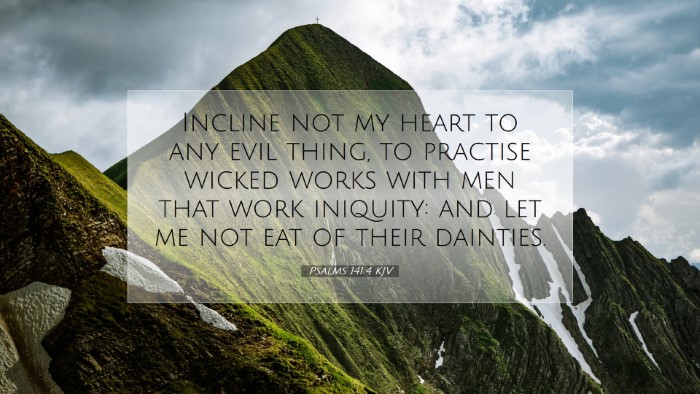Psalms 141:4 - Commentary and Insights
Bible Verse: Psalms 141:4 - "Incline not my heart to any evil thing, to practice wicked works with men that work iniquity: and let me not eat of their dainties."
Introduction
This verse from Psalms reflects a deep spiritual insight concerning the protection of the heart and the mind from evil. The Psalmist, traditionally understood to be David, expresses a personal plea for divine assistance to remain untainted by the influences of wickedness surrounding him. This commentary examines various elements of the verse combining insights from respected public domain commentaries.
Understanding the Text
The verse is a supplication that reveals the psalmist’s awareness of the innate propensity of the heart towards evil. Matthew Henry emphasizes the need for divine protection, noting that the human heart is prone to err and requires God's intervention. The psalmist’s request is for God to steer his heart away from evil and to keep him from participating in the wicked actions of others.
Albert Barnes views this verse as a form of moral and religious vigilance, suggesting that by asking not to be inclined to evil, the Psalmist acknowledges the struggle between the desires of the flesh and the call to holiness. He notes that associating with those who do evil can lead one to partake in their actions and thus his prayer is both a recognition of this danger and a plea for divine assistance.
The Nature of Human Desire
The inclination of the heart is a crucial theme in this psalm, specifically highlighted by Adam Clarke. Clarke points out that the heart must be guarded because it is deceitful and can easily lead one astray. The notion of 'inclining the heart' implies an active engagement, suggesting not merely an external influence but an internal struggle as well. This battle is a recurring theme in Biblical literature, paralleling the Apostle Paul’s discourse in Romans 7 about the conflict between the flesh and the spirit.
Community Influence and Its Consequences
The psalmist's plea also addresses the communal aspect of evil. By specifying 'wicked works with men that work iniquity,' he acknowledges the danger of social influence. Matthew Henry notes that the company we keep has a profound impact on our moral decisions. The refrain from sharing in their 'dainties' emphasizes a conscious decision to avoid the pleasures that come from sinful alliances. Such reflections serve as a reminder to believers today to choose their companions wisely and to be alert to the moral implications of their associations.
The Call to Holiness
In another vein, Albert Barnes correlates this verse’s personal plea to a broader theological principle of holiness. He suggests that the psalmist is articulating a deeper desire for sanctification, recognizing that fellowship with the wicked can taint one's pursuit of holiness. Hence, the earnest request becomes a foundation for understanding the believer's journey towards sanctification through the empowerment of the Holy Spirit.
Conclusion
In summary, Psalms 141:4 is rich with implications regarding the human heart's vulnerability to evil and the necessity of divine assistance in maintaining integrity in one's spiritual walk. It serves as a timeless reminder of the importance of guarding one’s heart against the temptations and influences of the world, while also underscoring the need for active prayer and reliance on God. Pastors, students, theologians, and scholars can utilize these insights to foster a deeper understanding of the personal and communal aspects of sin and righteousness in their theological studies and pastoral applications.
Reflections for Application
- Personal Vigilance: Reflect on the areas of life where one may be vulnerable to evil influences.
- Social Associations: Evaluate friendships and community relationships in light of moral integrity.
- Prayer Life: Incorporate the themes of Psalms 141:4 into daily prayer, asking God to direct the heart towards good and away from temptation.
- Holiness Pursuit: Commit to fostering an environment of holiness both personally and within the church community.


